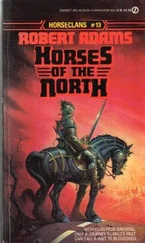Bili of Morguhn had liked what he had seen in approaching this capital city of the monarch they all now were serving. There were but two approaches up the flanks of the mountain— one from due south and another from southeast and both converging a good quarter mile shy of the outer defenses, leaving but the single road up to the gates. The young commander also noted that although the underlying road had been hewn from the living stone of the mountain, it was overlaid with a corduroy of well-worn logs, and he doubted not that somewhere in or on the defenses above, there awaited vats or tuns of oil with which those very logs over which he and his column now rode might be drenched, then fired with an enemy upon them.
Sitting on the lap of the mountain, New Kuhmbuhluhnburk had scant need of defensive walls, so the arc of walls it did have were low—no more than about ten yards high, Bili guessed—but they looked every bit as solid as the living stone beneath them. Built by the Kleesahk and the even huger pure blood Teenéhdjook, the stones were the largest dressed masonry that Bili had ever before seen, and he doubted that the siege engine to breach them existed. Not even those made for him last summer by the Kleesahks themselves could have damaged those walls in less than two or three years of steady pounding.
No, he thought, this New Kuhmbuhluhnburk would never fall to open attack, not with any decent sort of garrison. Did a reliable source of adequate water exist up there, along with ample provisions, the city could likely outlast the patience of any besiegers, too. That left only treachery from within, that or one of the deadly plagues that so often ran their course through garrisons and civil populations under siege.
On the ascending roadway, just beyond the outer works, Prince Byruhn and a score of peacock-bright noblemen had met Bili and, after requisite courtesies and a brief round of introductions, had joined with them to ride up to, into and through the city. Along broad, stone-paved streets they rode, between stone slate-roofed houses and lines of lustily cheering New Kuhmbuhluhnburkers.
Astride his big stallion, Mahvros—who gleamed like black onyx and proudly flaunted along in his high-stepping parade strut—beside the prince, with the silken banners of New Kuhmbuhluhn, Morguhn and the wolf device of Byruhn being borne just behind, Bili coolly wondered privately just how much of the noisy greetings of the populace was spontaneous and how much performed on orders from Byruhn or his royal sire.
Amid the tumult, conversation of any nature with the prince was an impossibility, but Bili, Rahksahnah and Pah-Elmuh the Kleesahk chatted via mindspeak.
“Pah-Elmuh,” beamed the young thoheeks , “in the event that these Skohshuns prove too numerous or powerful for whatever field army the kingdom finally manages to scrape together, how well supplied is this city to withstand a lengthy siege? Are there existing stores of food and forage? And how reliable is the supply of water?”
The powerful beaming of the Kleesahk replied, “Since first this city was built, there have always been reserve stores of grain, dried or smoked meats, pickled vegetables and suchlike. The first king always feared that his hateful enemies from the north might pursue him and pen him and his folk up herein, and this precaution is now become habitual. But I have been long away from New Kuhmbuhluhnburk and I therefore know not just what quantities lie available. For that information, you must confer with Prince Byruhn. As to forage, I know not, but few beasts have ever been lodged within the walls at any one time; most are kept on the plain, below, and brought up as needed.
“Within the bowels of the mountain is a huge lake fed by many small springs in its bed. Years agone, this lake’s overflow ran out of the side of the mountain, across the smaller plateau whereon the citadel now stands, then down its nearer slope and partway around its base to pour down the northern flank of the mountain.
“Good King Mahrtuhn I, when first he chose this site for thecity he envisioned, showed the Teenéhdjook and Kleesahk how to dam up this steady flow and then channel the resultant accumulation of water to supply the smaller and the larger plateaus with pure and plentiful water. Populous as that city hefounded has become over the passing years, still is there no dearth of water for all purposes of those who here dwell.”
“And this underground lake has never been dry?” Bili probed. “Its level never fluctuates?”
“Never, Lord Champion,” the Kleesahk assured him. “Even in the very aridest of drought years has the flow stayed clear and cold and copious. I think, as did the good King Mahrtuhn, that some mighty river must flow far, far beneath King’s Rest Mountain, so far down that it is unaffected by events upon theskin of earth and rock upon which we all dwell.”
“The Hold of the Moon Maidens was watered by such spring-fed lakes and pools,” put in Rahksahnah. “A few of them were of an icy coldness, but most were warm and some were boiling hot. It was these that kept the hold at an even temperature all of each year; even when snow and ice lay heavy upon the surrounding mountains and valleys, still did grain and other food crops and even bright flowers grow and ripen in the hold.
“The very ground and rocks themselves were warm to the touch, in our lost hold, so that the cold water falling from above rose up and often shrouded much of the land in a soft mist.”
“The northern safe-glen, that one now squatted upon by theSkohshuns, has three hot springs,” attested Pah-Elmuh.
“It is never so warm of winters as that one you describe, my lady, but even so it never is as cold as are the surrounding lands.”
“I would much like to see this glen, Pah-Elmuh,” beamed the brahbehrnuh . “Could such be arranged, perhaps it might serve as a new home for those of the Maidens of the Silver Lady who still hunger for the old ways, the ways of the hold. They would have to choose a new brahbehrnuh , of course, for my way now lies with my Bili and our little son, but I think that Kahndoot might fill that office far better than even I might have done, and she has yet to choose a man-mate.”
But Bili, anxious to gain knowledge of this position he might one day soon have to defend or, at least, share in defending, abruptly returned to the subject he had chosen.
“I can discern but the two gates, Pah-Elmuh, the one into the lower city and that one up ahead, leading into the keep. Is there then no way to secretly sally out to prick a besieger? So meticulous a planner, so skilled a soldier as this King Mahrtuhn clearly was must surely have provided such a necessary convenience for those who might one day have to defend his city.”
“There is assuredly such a way,” beamed the Kleesahk. “It is tunneled through the mountain itself, and debouches into three branches, each leading to a well-concealed exit. Indeed, we passed close enough to one such to have touched the stones sealing it, today, on our approach to the city. Veteran as you are in the wars and ways of true-men, you did not note it, Lord Champion. Did you?”
“No, I did not,” admitted Bili ruefully. “Despite the fact that I was examining, seeking, searching out any true or possible weakness to the city’s approaches and defenses, I saw no trace of any tunnel mouth along the way we rode, Pah-Elmuh. Perhaps, had I dismounted, been afoot… ?”
“You still would not have found it, Lord Champion, even had you known the general area in which it lies. Nor can the mighty stones sealing it be shifted from without… certainly not by true-men. Nor are the other two egresses any less %well concealed and inaccessible from without.”
Читать дальше












